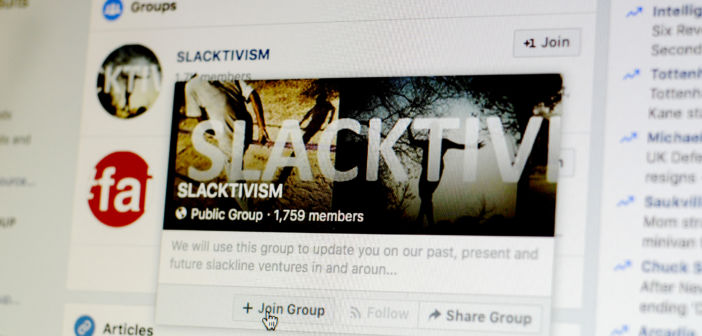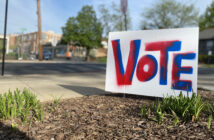On Aug. 12, hundreds of white nationalists gathered in Charlottesville, Virginia, to protest the removal of a Confederate statue. Counterprotesters rallied against the group, leading to numerous fights and incidents over the course of the weekend. One counterprotester, Heather Heyer, was killed after being struck by a car driven into the crowd.
On Aug. 15, President Donald Trump said there were “some very fine people” on both sides of the protests.
Kelly McCoy, ’17, was done. This was the last straw.
“I wanted to do something about it instead of looking at my phone and being frustrated,” McCoy said.
On Aug. 15, McCoy created an online petition asking the board of trustees to revoke Trump’s honorary Lehigh degree. By Aug. 17, the petition had surpassed 15,000 signatures. To date, 30,887 people have signed it.
McCoy’s online activism is a prime example of slacktivism, a phenomenon where people help a cause simply by sharing or liking a page, image or petition. Being a ‘participant’ of a social movement has become extremely easy with the internet.
“I knew that starting the petition wouldn’t lead to Trump’s impeachment,” McCoy said, “but it would get my community thinking, ‘What are we willing to fight for?'”
Some may look at these slacktivists as “slackers.” You can virtually sign a petition from your bed and share a YouTube video to Facebook on your mobile phone.
Critics say these online activists aren’t doing anything to help the cause, but the click makes them feel satisfied that they contributed.
On the contrary, some say slacktivism could just be this generation’s form of activism.
“Social media is an easy way to make yourself seem involved in something without the commitment of following through,” said Caroline Jennings, ’19, executive director of Lehigh University Dance Marathon. “It’s not a bad thing, but it’s a way for people to do a minimal amount for a cause.”
Jeremy Littau, a journalism professor who researches digital media, said he is not a fan of the term “slacktivism.” He said this type of behavior has been going on for generations.
“There has always been varying levels of participation,” Littau said. “You take a protest group and those are always the people who are really heavily involved and then (there are) people that are moderately involved, the people who write checks.”
Littau said this is commonly known as “checkbook activism.”
“We have always had this,” Littau said. “Writing a check is easier than showing up to a protest in much the same way that clicking a like button (is easier).”
The internet provides networks that allow users to extend themselves past their immediate circles. Social media can help get a message out and create campaign exposure.
McCoy said social media gives people a space to converse on issues and their feelings and beliefs in a way that would have been impossible without it. She thinks social media is vital to any cause because it creates active conversation.
“The only way change is going to happen in society is if people start talking and listening to each other,” McCoy said. “If people aren’t talking to each other, nothing is going to change.”
Although Lehigh is seen on various lists of top party schools, it is not known for its political involvement.
“I think the student body at Lehigh, or at least the majority of the student body, (has) a reputation for not being as politically active,” McCoy said. “But I feel like that is changing in the years that I have been there.”
She said she has seen more students become active in the community, though the number of student activists remains low.
“I think there is a general culture of not engaging here very much,” Littau said.
He said although students might be actively liking or sharing on social media, few students experiment with in-person action.
Littau completed his graduate work at University of Missouri, a large public school where, he said, there was a strong culture around campus events.
“Whenever there was an event that was intellectual or cultural in nature that was there to critique the current environment in politics, students showed up,” Littau said, “And then I got here and was surprised by how rarely I see students at these events.”
Littau said that although there are some students going to campus events, the attendance tends to consist of the same people over and over.
“There is just a culture of disaffection around it,” Littau said. “They just don’t engage with things that are supposed to rock their world view a little bit. I don’t see slacktivism as a problem at Lehigh, I see a general disinterest in taking time out of their social calendar for events that are suppose to challenge them.”
Littau said the structure of classes could contribute to this disinterest. He said the curriculum of the business and engineering schools isn’t oriented toward giving credit for thinking critically about society outside of the classroom, whereas much of the arts and science curriculum is built around that type of inquiry.
However, Jennings said Lehigh students are very socially and politically engaged.
“At Lehigh there are so many passionate individuals,” Jennings said. “Compared to some of my friends at other schools, more people here are involved in other things outside of their academics, so I think in general people here are involved but there still is a slacktivist culture.”
Jennings said many Lehigh students participate in clubs and other organizations to find a community within the Lehigh environment. She said although slacktivism may be more prevalent at Lehigh than activism, that does not mean Lehigh is necessarily an uninvolved campus.
“Even though slacktivism may not have the most amount of effort put behind it, it is still an important component of social change and it is still impacting issues,” McCoy said.
McCoy said social media can make causes and campaigns more visible because it’s impossible to change something that no one knows about.
Littau said he believes that just like generations before, Lehigh students are taking the time in college to find themselves. Although they might not be active at this moment, he hopes that students take what they learn here and become active in the future.
“I think the lack of activist activity is part of the same story we have seen for generations with college students — their worlds are too small when they enter and hopefully they will be bigger by the time they leave” Littau said. “My hope is that by the time they get out of here, they are least enough awake to the world to A) know what they care about, B) know how to get involved and C) that they will eventually do it.”






Comment policy
Comments posted to The Brown and White website are reviewed by a moderator before being approved. Incendiary speech or harassing language, including comments targeted at individuals, may be deemed unacceptable and not published. Spam and other soliciting will also be declined.
The Brown and White also reserves the right to not publish entirely anonymous comments.